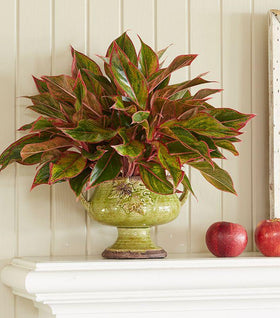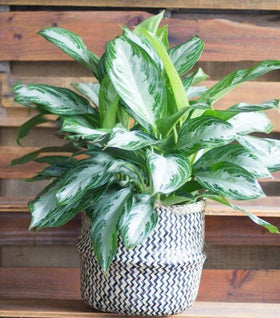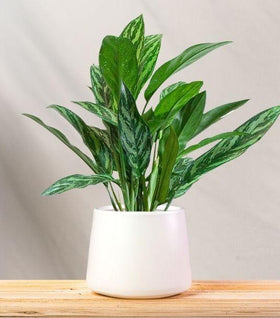Aglaonema Chinese Evergreen Plants
Effortless Color for Low-Light Spaces
At Garden Goods Direct, we reach for Aglaonema when a space needs instant polish with near-zero drama. Chinese evergreens are the definition of dependable: they tolerate low to medium light, forgive a missed watering, and still deliver luxury-grade foliage in silvers, emeralds, speckles, and blush-pink variegation. Whether you’re finishing a lobby, softening a bookshelf, or adding life to a window-adjacent office, Aglaonema brings calm, modern texture that reads designer without demanding designer care. They’re naturally air-purifying, hold color year-round, and keep a compact, tidy habit that fits real rooms and real schedules.
What makes our Aglaonema different? We curate proven interior performers—root-strong plants that establish quickly in decorative planters, along with clear guidance on light, watering frequency, and potting mix, so you achieve thriving growth, not guesswork. Your order is packed by growers who handle these plants daily, backed by our We Grow Together Promise and expert, friendly support. If you’re hunting for a low-maintenance, high-impact houseplant to anchor your décor (and your confidence), start here: Aglaonema is the effortless win.
Why Chinese Evergreens Win in Real Homes (Color, Ease, Reliability)
Aglaonema combines statement foliage with forgiving care, as it thrives in bright, indirect to lower light zones where many houseplants fade. Variegated leaves—silver, sage, charcoal, and pink—create instant contrast against wood, metal, and stone finishes, elevating shelves, consoles, and corners without constant pruning.
Chinese Evergreens are also humidity-flexible and drought-tolerant once established. Provide consistent, moderate moisture (allowing the top inch to dry), and you’ll enjoy steady new growth and a compact silhouette that stays photo-ready between waterings.
Forms & Foliage You’ll Love (Silvers, Speckles & Blush)
Expect broad, lance-shaped leaves with a satiny sheen that exude an upscale appearance in any pot. Silver-heavy types brighten dim spaces; speckled and banded cultivars add movement; pink-blushed selections bring a subtle, warm accent that complements neutral interiors. Mature plants form full, elegant clumps that look designer with minimal styling—one plant, one beautiful statement.
Where Aglaonema Works Hard (Home, Office, Hospitality)
Use Chinese evergreen as a living anchor in entryways, conference rooms, and living spaces where light is imperfect and traffic is high. It’s ideal for bookshelves, media consoles, bedside tables, and reception desks—any spot that requires a soft texture without requiring weekly maintenance. Group 3 plants in varied heights for a boutique, layered look, or flank a sofa with matching floor-size specimens for symmetry and a calm effect.
Care Made Simple (Light, Water, Potting & Growth)
- Light: Bright-indirect to medium/low light; avoid harsh afternoon sun.
- Water: Let the top 1–2 inches of soil dry; water thoroughly, then drain. Reduce frequency in winter.
- Soil & Pot: A peat-free, chunky aroid mix or high-quality indoor blend with perlite for airflow. Use containers with drainage.
- Humidity & Temperature: The average home humidity is fine; target a temperature range of 60–85°F and avoid cold drafts.
- Feeding: Light monthly feeding in spring/summer with a balanced houseplant fertilizer.
- Upkeep: Rotate plants every quarter for even growth; wipe leaves to increase photosynthesis and promote shine.





